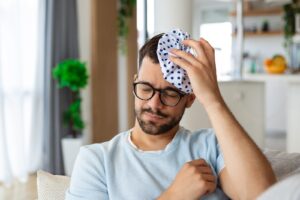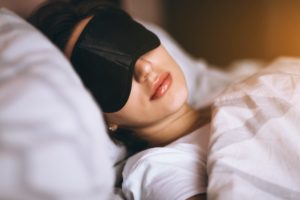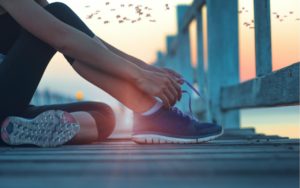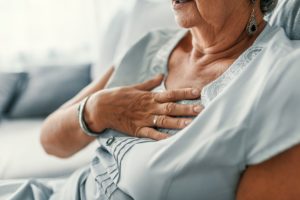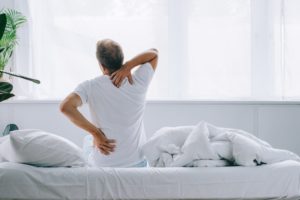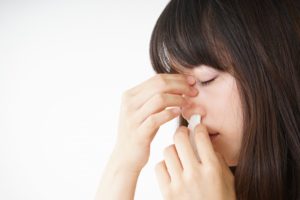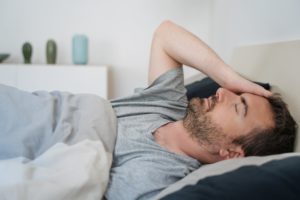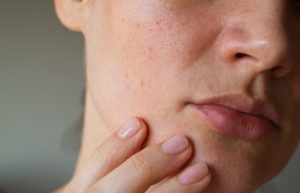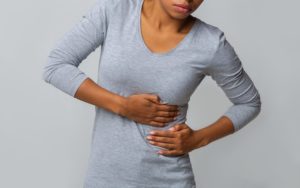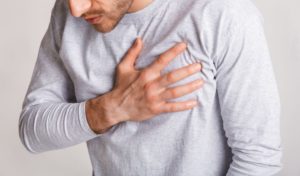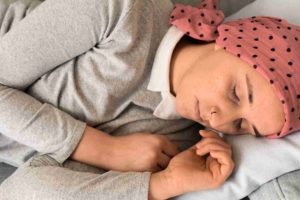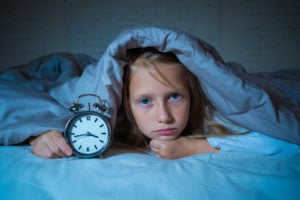Sleep and Overeating
It’s common knowledge that both getting good sleep and following a healthy diet are essential for overall health. Often overlooked, though, is that there is an important relationship between sleep and nutrition.
A major part of that relationship is the link between sleep and overeating. Sleep deprivation can affect appetite and food choices, increasing the likelihood of both overeating and consuming unhealthy foods.
Overeating can affect sleep as well. Eating too much, especially when it involves heavy or spicy foods, can worsen sleep by interfering with digestion and raising the risk of heartburn. For this reason, most experts advise against eating too much and too close to bedtime.
Does Lack of Sleep Cause Overeating?
Research studies have found that insufficient sleep increases overeating and unhealthy food choices. Not surprisingly, studies have also linked insufficient sleep to weight gain and a higher risk of obesity .
Disruptions to normal hormone production are a driving factor behind sleep deprivation leading to overeating. Sleep plays a vital role in regulating hormone levels , including the hormones leptin and ghrelin, which are integral to hunger and appetite.
Ghrelin is closely related to hunger while leptin is tied to feeling full. A lack of sleep has been found to trigger increased levels of ghrelin and decreased levels of leptin , leading to increased hunger and appetite. This makes overeating more likely, especially since more time awake creates increased opportunities to eat .
Insufficient sleep also affects parts of the brain that determine how we think about food . In studies of people with limited sleep, brain activity is enhanced in areas that are involved in viewing food as a positive reward, making us more vulnerable to eating too much.
Even worse, these changes in the brain seem to be strongest with foods that can more easily contribute to obesity. One study found increased appetite for high-calorie foods in people who didn’t get enough sleep. Similar results have been found in young children and adolescents , indicating that poor sleep may be a factor contributing to rising rates of childhood obesity.
Patterns of overeating can lead to weight gain, which raises the risk of obstructive sleep apnea, a breathing disorder that causes persistent sleep interruptions. Overeating, especially at night, can disrupt sleep. As a result, a vicious cycle can emerge in which poor sleep triggers overeating that can play a role in further worsening sleep.

Does Overeating Affect Sleep?
Overeating can interfere with normal sleep. After a big meal, the body has to devote energy to the digestive process, which typically takes several hours. But digestion usually slows during sleep , putting your body’s normal sleep process at odds with the stomach’s needs for digestion. This may explain why studies have found increased sleep disruptions after eating close to bedtime.
Research has found an association between eating higher quantities of calories and fat and a decreased amount of sleep . The effects of overeating on sleep may be exacerbated by excess intake of certain types of foods. For example, meals with low fiber and high amounts of sugar and saturated fat have been correlated with interrupted sleep .
Overeating can cause discomfort, which can be a barrier to sleep. Besides making you feel too full, big meals may induce and exacerbate acid reflux, in which the resultant heartburn can make it harder to get quality sleep . Heartburn may be even more likely if overeating involves certain foods such as spicy foods, fatty foods and chocolate, which can cause indigestion . Large meals with certain foods can also disrupt sleep by increasing body temperature which runs counter to the body’s typical process of cooling down during sleep.
How Can You Sleep Well After Overeating?
If you’ve eaten too much but still want to get good sleep, a few tips may help:
- Give it time: If you can, wait 3-4 hours before going to bed so that your body has time to devote to digestion.
- Drink water: Feeling stuffed may cause you to avoid drinking water, but it’s important to stay hydrated, but avoid carbonated beverages due to the gas content.
- Avoid alcohol and caffeine: Both of these can interfere with your sleep, so it’s best to avoid them if you want to rest well.
- Try light physical activity: You don’t want to overdo it, but a short walk at a slow or moderate pace or light stretching may help you feel more comfortable as you digest.
- Prevent heartburn: Two strategies for preventing acid reflux include elevating the head of your bed by six inches and lying on your left side . If you’re worried about heartburn, these steps may help you sleep without interruption.
- Optimize your bedroom: Eliminating potential sleep disruptions, such as from excess light or noise, may help you doze off and quickly get back to sleep if you wake up during the night after overeating.
Is It Harmful to Eat Before Bed?
It’s not just how much or what you eat; the timing of when you eat matters, too . Studies have found that eating within three hours of your bedtime increases the likelihood of sleep disruptions, and that risk may be even greater if you overeat at dinner. Acid reflux, which is more likely with a late dinner , can further reduce sleep quality.
Beyond its impact on your sleep, eating before bed may also contribute to weight gain . The body’s internal clock, known as its circadian rhythm, empowers the body to better digest food and regulate blood sugar during the day. In this way, a late dinner can negatively affect metabolism , increase body fat, and heighten the risk of obesity.
Given its potential impact on sleep and weight, studies indicate that, in general, it’s preferable to consume the majority of caloric intake during the day . That said, because dietary needs can vary depending on a person’s circumstances, anyone concerned about their nutrition and sleep should talk with their doctor or a nutritionist for advice that is tailored to their situation.

Still have questions? Ask our community!
Join our Sleep Care Community — a trusted hub of sleep health professionals, product specialists, and people just like you. Whether you need expert sleep advice for your insomnia or you’re searching for the perfect mattress, we’ve got you covered. Get personalized guidance from the experts who know sleep best.
References
22 Sources
-
Wu, Y., Zhai, L., & Zhang, D. (2014). Sleep duration and obesity among adults: a meta-analysis of prospective studies. Sleep medicine, 15(12), 1456–1462.
https://pubmed.ncbi.nlm.nih.gov/25450058/ -
Kim, T. W., Jeong, J. H., & Hong, S. C. (2015). The impact of sleep and circadian disturbance on hormones and metabolism. International journal of endocrinology, 2015, 591729.
https://pubmed.ncbi.nlm.nih.gov/25861266/ -
Spiegel, K., Tasali, E., Penev, P., & Van Cauter, E. (2004). Brief communication: Sleep curtailment in healthy young men is associated with decreased leptin levels, elevated ghrelin levels, and increased hunger and appetite. Annals of internal medicine, 141(11), 846–850.
https://pubmed.ncbi.nlm.nih.gov/15583226/ -
St-Onge M. P. (2017). Sleep-obesity relation: underlying mechanisms and consequences for treatment. Obesity reviews: an official journal of the International Association for the Study of Obesity, 18 Suppl 1, 34–39.
https://onlinelibrary.wiley.com/doi/10.1111/obr.12499 -
St-Onge, M. P., McReynolds, A., Trivedi, Z. B., Roberts, A. L., Sy, M., & Hirsch, J. (2012). Sleep restriction leads to increased activation of brain regions sensitive to food stimuli. The American journal of clinical nutrition, 95(4), 818–824.
https://pubmed.ncbi.nlm.nih.gov/22357722/ -
Greer, S. M., Goldstein, A. N., & Walker, M. P. (2013). The impact of sleep deprivation on food desire in the human brain. Nature communications, 4, 2259. https://doi.org/10.1038/ncomms3259
https://www.nature.com/articles/ncomms3259 -
Mullins, E. N., Miller, A. L., Cherian, S. S., Lumeng, J. C., Wright, K. P., Jr, Kurth, S., & Lebourgeois, M. K. (2017). Acute sleep restriction increases dietary intake in preschool-age children. Journal of sleep research, 26(1), 48–54.
https://pubmed.ncbi.nlm.nih.gov/27641365/ -
Weiss, A., Xu, F., Storfer-Isser, A., Thomas, A., Ievers-Landis, C. E., & Redline, S. (2010). The association of sleep duration with adolescents’ fat and carbohydrate consumption. Sleep, 33(9), 1201–1209.
https://pubmed.ncbi.nlm.nih.gov/20857867/ -
Dantas, R. O., & Aben-Athar, C. G. (2002). Aspectos dos efeitos do sono no aparelho digestório [Aspects of sleep effects on the digestive tract]. Arquivos de gastroenterologia, 39(1), 55–59.
http://www.scielo.br/scielo.php?script=sci_arttext&pid=S0004-28032002000100010&lng=pt&tlng=pt -
Chung, N., Bin, Y. S., Cistulli, P. A., & Chow, C. M. (2020). Does the Proximity of Meals to Bedtime Influence the Sleep of Young Adults? A Cross-Sectional Survey of University Students. International journal of environmental research and public health, 17(8), 2677.
https://pubmed.ncbi.nlm.nih.gov/32295235/ -
Grandner, M. A., Kripke, D. F., Naidoo, N., & Langer, R. D. (2010). Relationships among dietary nutrients and subjective sleep, objective sleep, and napping in women. Sleep medicine, 11(2), 180–184.
https://pubmed.ncbi.nlm.nih.gov/20005774/ -
St-Onge, M. P., Roberts, A., Shechter, A., & Choudhury, A. R. (2016). Fiber and Saturated Fat Are Associated with Sleep Arousals and Slow Wave Sleep. Journal of clinical sleep medicine : JCSM : official publication of the American Academy of Sleep Medicine, 12(1), 19–24.
https://pubmed.ncbi.nlm.nih.gov/26156950/ -
Vela, M. F., Kramer, J. R., Richardson, P. A., Dodge, R., & El-Serag, H. B. (2014). Poor sleep quality and obstructive sleep apnea in patients with GERD and Barrett’s esophagus. Neurogastroenterology and motility : the official journal of the European Gastrointestinal Motility Society, 26(3), 346–352.
https://pubmed.ncbi.nlm.nih.gov/24460751/ -
Nisar, M., Mohammad, R. M., Arshad, A., Hashmi, I., Yousuf, S. M., & Baig, S. (2019). Influence of dietary intake on sleeping patterns of medical students. Cureus, 11(2), e4106.
https://pubmed.ncbi.nlm.nih.gov/31058000/ -
Edwards, S. J., Montgomery, I. M., Colquhoun, E. Q., Jordan, J. E., & Clark, M. G. (1992). Spicy meal disturbs sleep: an effect of thermoregulation?. International journal of psychophysiology : official journal of the International Organization of Psychophysiology, 13(2), 97–100.
https://linkinghub.elsevier.com/retrieve/pii/016787609290048G -
The National Institute of Diabetes and Digestive and Kidney Diseases Health Information Center. (2020, July). Treatment for GER & GERD., Retrieved November 17, 2020, from
https://www.niddk.nih.gov/health-information/digestive-diseases/acid-reflux-ger-gerd-adults/treatment -
van Herwaarden, M. A., Katzka, D. A., Smout, A. J., Samsom, M., Gideon, M., & Castell, D. O. (2000). Effect of different recumbent positions on postprandial gastroesophageal reflux in normal subjects. The American journal of gastroenterology, 95(10), 2731–2736.
https://pubmed.ncbi.nlm.nih.gov/11051341/ -
McHill, A. W., Phillips, A. J., Czeisler, C. A., Keating, L., Yee, K., Barger, L. K., Garaulet, M., Scheer, F. A., & Klerman, E. B. (2017). Later circadian timing of food intake is associated with increased body fat. The American journal of clinical nutrition, 106(5), 1213–1219.
https://pubmed.ncbi.nlm.nih.gov/28877894/ -
Piesman, M., Hwang, I., Maydonovitch, C., & Wong, R. K. (2007). Nocturnal reflux episodes following the administration of a standardized meal. Does timing matter?. The American journal of gastroenterology, 102(10), 2128–2134.
https://journals.lww.com/00000434-200710000-00004 -
Gu, C., Brereton, N., Schweitzer, A., Cotter, M., Duan, D., Børsheim, E., Wolfe, R. R., Pham, L. V., Polotsky, V. Y., & Jun, J. C. (2020). Metabolic Effects of Late Dinner in Healthy Volunteers-A Randomized Crossover Clinical Trial. The Journal of clinical endocrinology and metabolism, 105(8), 2789–2802.
https://pubmed.ncbi.nlm.nih.gov/32525525/ -
Lopez-Minguez, J., Gómez-Abellán, P., & Garaulet, M. (2019). Timing of Breakfast, Lunch, and Dinner. Effects on Obesity and Metabolic Risk. Nutrients, 11(11), 2624.
https://pubmed.ncbi.nlm.nih.gov/31684003/ -
Rangaraj, V. R., Siddula, A., Burgess, H. J., Pannain, S., & Knutson, K. L. (2020). Association between Timing of Energy Intake and Insulin Sensitivity: A Cross-Sectional Study. Nutrients, 12(2), 503.
https://pubmed.ncbi.nlm.nih.gov/32079066/




